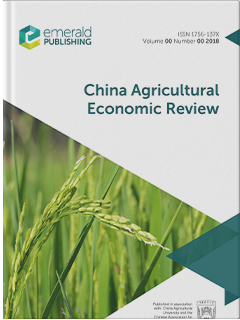教育是否会影响消费者对转基因食品的态度?来自中国两轮教育改革的证据
IF 4.6
2区 经济学
Q1 AGRICULTURAL ECONOMICS & POLICY
引用次数: 2
摘要
目的分析教育对消费者对转基因食品认知和态度的因果关系。作者提出了一个分析框架来阐明教育水平和教育内容在转基因食品态度形成中的作用,并利用中国教育改革作为自然实验对理论预测进行实证检验。对于教育水平,本文采用《义务教育法》的实施情况来构建工具变量。在教育内容上,笔者利用第八次课程改革中生物教材的修订,实施了交错差中差估计。作者使用了两项全国性家庭调查,即2017年中国真实进步指标调查(CGPiS)和中国家庭财务调查(CHFS),并结合省级教育改革数据。结果:义务教育法实施后的教育水平对消费者对转基因食品的认知和态度的影响不显著,而第八次课程改革引入的基因科学正规教育的获得对消费者对转基因食品的认知和态度具有统计学上显著的积极影响。原创性/价值本研究首次采用具有全国代表性的数据,探讨教育程度和教育内容对消费者对转基因食品认知和态度的因果关系。这也是第一次评估中国生物教科书改革的长期效果。这些发现有助于打开教育如何塑造人们偏好和态度的黑盒子,并强调了正规生物学教育在形成消费者接受转基因食品意愿方面的重要性。本文章由计算机程序翻译,如有差异,请以英文原文为准。
Does education affect consumers' attitudes toward genetically modified foods? Evidence from China's two rounds of education reforms
PurposeThis study analyzes the causal effect of education on consumers' cognition and attitudes toward genetically modified (GM) foods.Design/methodology/approachThe authors propose an analytical framework to clarify the role of education levels and education content in the formation of attitudes toward GM foods and utilize education reforms in China as natural experiments to test the theoretical predictions empirically. For education levels, the authors use Compulsory Education Law's implementation to construct the instrument variable. For education content, the authors utilize the revision of the biology textbook in the Eighth Curriculum Reform to implement staggered difference-in-difference estimation. The authors use two national household surveys, the China Genuine Progress indicator Survey (CGPiS) and the China Household Finance Survey (CHFS) of 2017, combined with provincial-level data of education reforms.FindingsThe education level, instrumented by the Compulsory Education Law's implementation, has an insignificant effect on consumers' cognition and attitudes toward GM foods, whereas the acquisition of formal education on genetic science, introduced by the Eighth Curriculum Reform, has a statistically significant and positive influence.Originality/valueThis is the first study to investigate the causal effects of education level and content on consumers' cognition and attitude toward GM foods using national representative data. It is also the first to evaluate the long-term effects of the biology textbook reform in China. The findings help open the black box of how education shapes people's preferences and attitudes and highlight the significance of formal biology education in formulating consumers' willingness to accept GM foods.
求助全文
通过发布文献求助,成功后即可免费获取论文全文。
去求助
来源期刊

China Agricultural Economic Review
AGRICULTURAL ECONOMICS & POLICY-
CiteScore
9.80
自引率
5.90%
发文量
41
审稿时长
>12 weeks
期刊介绍:
Published in association with China Agricultural University and the Chinese Association for Agricultural Economics, China Agricultural Economic Review publishes academic writings by international scholars, and particularly encourages empirical work that can be replicated and extended by others; and research articles that employ econometric and statistical hypothesis testing, optimization and simulation models. The journal aims to publish research which can be applied to China’s agricultural and rural policy-making process, the development of the agricultural economics discipline and to developing countries hoping to learn from China’s agricultural and rural development.
 求助内容:
求助内容: 应助结果提醒方式:
应助结果提醒方式:


